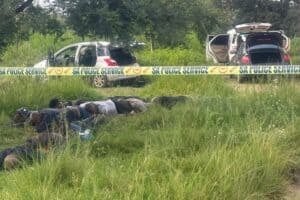Decades after the deaths of the Cradock Four, a new chapter unfolds as the inquest is reopened.

The inquest into the deaths of former anti-apartheid activists, known as the Cradock Four, has been reopened after the introduction of new evidence.
On 27 June 1985, Mathew Goniwe, Sparrow Mkonto, Fort Calata, and Sicelo Mhlauli left Gqeberha, previously known as Port Elizabeth, after attending a meeting and were on their way home to Cradock. However, the Cradock Four never arrived.
The last people to see them alive were their killers, whose identity and motive remained unknown until the Truth and Reconciliation Commission (TRC).
Goniwe, Calata, Mkonto, and Mhlauli were abducted and murdered, and their badly burnt bodies, with stab wounds were discovered in two different places days later. The anti-apartheid activists had attracted the attention of the National Party’s Security Branch (SB) on numerous occasions.
Inquest reopened
The Department of Justice and Correctional Services announced on Friday that Minister Ronald Lamola acted on the recommendation of the National Prosecuting Authority (NPA) to approach the Eastern Cape Judge President to appoint a judge and reopen the inquest into the Cradock Four’s deaths.
ALSO READ: NPA slammed for ‘unacceptable’ Cradock Four prosecution delays
This comes after two inquests were held, and according to the department, both the De Beer inquest in 1987 and the inquest in 1993 produced more questions than answers. The inquests also didn’t identify the murderers of the Cradock Four.
“The narrative that the identity of the murderer(s) of the deceased was unknown, or why and how they died, would have remained a well-kept secret if the SB members had not appeared before the TRC and revealed how and why the deceased were killed, 14 years after the gruesome deaths of the deceased,” said department spokesperson Chrispin Phiri.
Interest of justice
The department said the main reason for reopening the investigations is that it is in the interests of justice. It added the NPA is adamant the evidence made available after the De Beer and Zietsman investigations is new and was not previously presented before a fresh order was issued.
It added that there were multiple inconsistencies between the first and second investigations and the new evidence after the findings warranted a retrial.
Lamola said it is in the interest of justice to finally bring closure to the families of the Cradock Four, who have been waiting decades for the truth about who killed their loved ones.
ALSO READ: Cradock Four families ask court to compel state to reveal records
“The privilege of presenting evidence in a democratic South Africa must be exercised. In the previous inquests, the voices of the families and those affected have not been heard. It is time for confidence in the justice system to be restored,” the minister said.
Families welcome reopening of inquest
The families of Goniwe, Calata, Mkonto, and Mhlauli welcomed the announcement to reopen the inquest.
“We, the families, wish to state (as we repeatedly told the NPA) that we would have preferred the prosecution of those implicated in this heinous act rather than reopen what amounts to a third inquest into the murders of the Cradock Four. However, the avenue of prosecution was firmly shut down by spurious delays and the eventual death of the last known suspect, Herman Barend du Plessis, in May 2023,” the families said in a joint statement.
They added they were hopeful the inquest and the truth would bring light to the assassinations and help them seek closure and healing.
“We, as the Cradock Four families, also urge the NPA and Minister Lamola to ensure that all outstanding TRC-related cases are resolved speedily,” they said.
ALSO READ: Cradock Four: Families launch fresh legal bid to reopen case






